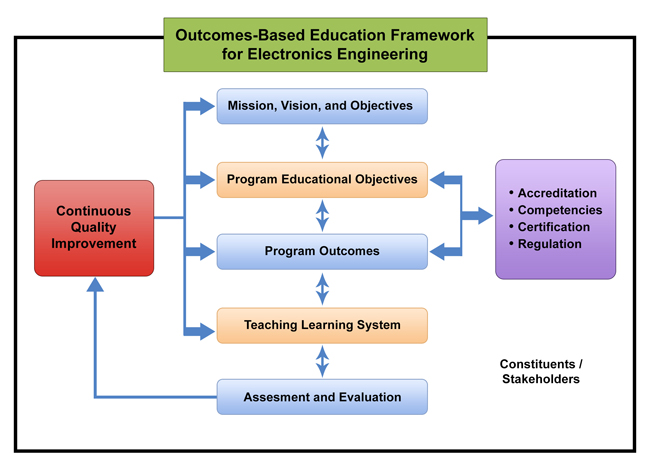Electronics engineering deals with the integration of available and emerging technologies with knowledge of mathematics and natural, social and applied sciences to conceptualize, design and implement new, improved or innovative electronic, computer and communications systems, devices, goods, services and processes.
The Bachelor of Science in Electronics Engineering will provide quality education in electronics engineering to meet the emerging needs of many employers in the region. The program emphasizes learning of fundamental engineering knowledge in subjects such as signals and systems, digital logic, circuits and electronics, and theory and applications of digital communications. The graduation requirements also include an engineering seminar and a capstone senior design project. It is expected that graduates of the program will have competitive skills in the areas of computer networking, wireless communications and satellite communications
The bachelor’s degree in electronics engineering is designed to prepare graduates for responsible engineering positions in design, development, research, applications and operation in the fields of communications, control systems, digital signal processing systems, electromagnetics, digital and analog electronic circuits, physical electronics, computer-aided design and power systems. The curriculum is built around a strong basic core of mathematics, physics and engineering science.


PROGRAM EDUCATIONAL OBJECTIVES
The University will produce Electronics Engineering graduates who are:
professionally competent and globally competitive;
equipped with technical competencies and are able to contribute to the country’s social and economic progress;
lifelong learners imbued with the UE core values of Excellence, Integrity, Professionalism, Teamwork, Commitment, Transparency, Accountability and Social Responsibility.
STUDENT OUTCOMES
Ability to apply knowledge of mathematics and science to solve engineering problems.
Ability to design and conduct experiments, as well as to analyze and interpret data.
Ability to design a system, component or process to meet desired needs within realistic constraints such as economic, environmental, social, political, ethical, health and safety, manufacturability, and sustainability, in accordance with standards.
Ability to function in multidisciplinary teams.
Ability to identify, formulate and solve engineering problems.
Understanding of professional and ethical responsibilities.
Ability to communicate effectively.
Broad education necessary to understand the impact of engineering solutions in global, economic, environmental and societal contexts.
Recognition of the need for and an ability to engage in lifelong learning.
Knowledge of contemporary issues.
Ability to use techniques, skills and modern engineering tools necessary for engineering practice.
Knowledge and understanding of engineering and management principles as a member and leader in a team, to manage projects in multidisciplinary environments.
ELECTRONICS ENGINEERING CURRICULUM
The ECE curriculum is applications-oriented and builds upon a background of applied science and mathematics, including the concepts and applications of calculus. Graduates are prepared to produce practical, workable and safe solutions to technologically challenging problems. Graduates are employed in the electronics and computer industries with responsibilities such as designing, installing and operating technical systems, analyzing and (re) engineering systems that embed computer hardware and software for unique applications, developing and producing products, managing manufacturing processes, and providing customer support for technical products and systems.
BSECE students may choose to specialize in one of the following three concentrations: electronic systems, microelectronics and telecommunications.
The electronic systems concentration is aimed at preparing persons for careers in control, electronics, instrumentation and power systems applications. This concentration allows a student to develop a broad-based knowledge of electrical/electronic fundamentals with an applications perspective.
The microelectronics (UET) concentration combines applied electronics, monolithic and hybrid integrated circuit processing and applications, device and component fabrication, and manufacturing. The objective of this concentration is to prepare persons to assume positions in the area of microelectronics manufacturing with immediately applicable knowledge, as well as to develop a strong foundation of electronic fundamentals and methods. Graduates of this concentration secure positions in processing, manufacturing operations and application areas in industry as members of diverse scientific engineering teams.
The telecommunications concentration encompasses the fundamentals of information and signal processing, modern bandwidth-efficient digital radio analysis with RF and microwave circuits and systems. Applications include telephone pulse code modulation, cable TV, fiber optic links, and satellite transmission circuits and systems.
CAREER OPPORTUNITIES
Electronics Engineering continues to be an attractive profession in great demand. It has rich traditions in design, development, testing, and commercialization of cellular and information superhighway technology, command, control and delivery of power of high-speed machines, digital networks, microprocessors and supercomputers, of materials such as superconductors and bio-materials, and VLSI circuits for consumer and industrial electronic applications. These fields have a strong impact on wireless communications, networking, and nanotechnology emerging industries.
The ECE program at UE Caloocan is a balance of engineering science and design. The freshman and sophomore year courses are structured to lay a solid foundation for the junior and senior level design courses by the introduction of courses in hardware, software, and the engineering sciences (math, physics, and chemistry).
THE LABORATORY
Design methodology and analysis techniques are stressed throughout the curriculum in the majority of the core courses required for graduation. The lecture classes are typically complemented by laboratory experiments that the student has designed, simulated and analyzed before commencing with the actual hands-on construction and testing. Students are well prepared in the hardware/software design procedure when they reach the final classes of Digital Signal Processing, Control Systems, Radio Frequency circuits, ECE electives and the Senior Project Classes. Skills in hardware, software and CAE that have been emphasized in the design process throughout the upper division classes are employed in the design of advanced electronic systems in senior and special project classes. Teamwork is stressed throughout the majority of the project classes.
Students have several pattern electives to choose from in advanced software and hardware design classes. Such classes include topics in networks, embedded systems, VHDL, digital signal processing, state machine design, VLSI, control systems, communications RF circuits and artificial intelligence.
The senior project class brings together the design and analysis skills acquired throughout the required and elective curriculum. This project is a culminating experience which involves teamwork, design, report writing and oral presentation. These experiences prepare our graduates to be successful engineers with an awareness of the many challenges involved in the workplace.
UE’S ECE ACHIEVEMENTS
UE’s ECE licensure exam topnotchers include Engrs. Ronnel P. Dayawon (2nd, October 2016), Neil M. Delos Reyes (8th, October 2016), Ivan M. Parayno (5th, September 2014), Danielle S. Maque (9th, March 2014), Ma. Lara N. Bantilo (4th, November 2010), Danny R. Supnet (2nd, October 2009), Mark Joseph B. Pe (8th, Oct. 2008), Christopher Jay R. Ababan (2nd, November 2006), Winston S. Camacho (1st, April 2006), Sonny Kristopher A. Lachica (7th, April 2005), and Ferdinand A. Dres (7th, April 2004), among many others.
FACULTY
Engr. Mark Anthony C. Aseoche – Department Chair, Electronics Engineering
Faculty Members
ECE Achievements to be added to the existing contents.
UE College of Engineering-Caloocan
Angelita D. Guia
Dean
Dr. Paraluman G. Sim
Associate Dean-Engineering
Dr. Maria Amelia E. Damian
Associate Dean-Computer Studies and Systems
Engr. Edelito A. Handig
College Secretary
UE College of Engineering-Caloocan Dean’s Office
✆ Dean: (632) 8-367-4572 local 166
✆ Direct Line: (632) 8-365-4121
Associate Dean and College Secretary:
✆ 8-367-4572 local 167
✆ Direct Line: 8-365-4121
General UE CEng’g Caloocan email address:
✉ ceng.cal@ue.edu.ph
Department Chairs Office:
✆ UE Caloocan Trunkline 8-367-4572
✆ CE Department: local 171
✆ CpE Department: local 172
✆ ECE Department: local 181
✆ EE Department: local 170
✆ ME Department: local 169
✆ CS/IT Department.: local 200
Social Info

